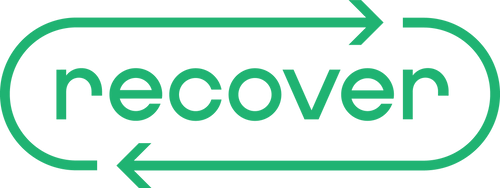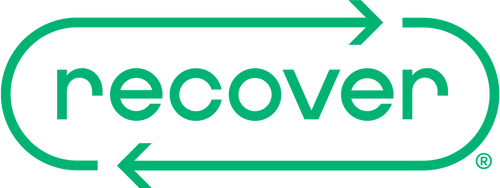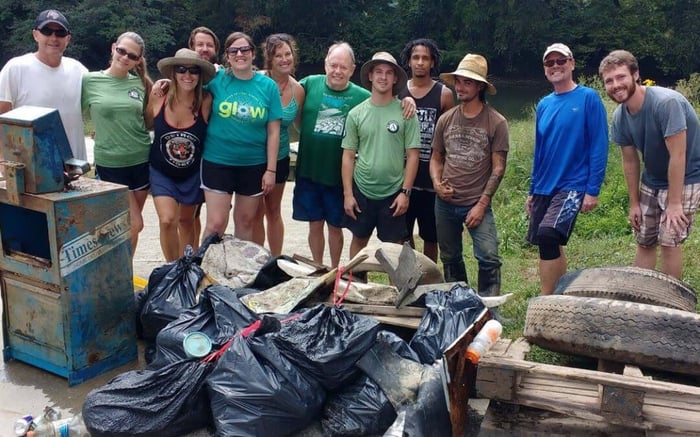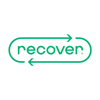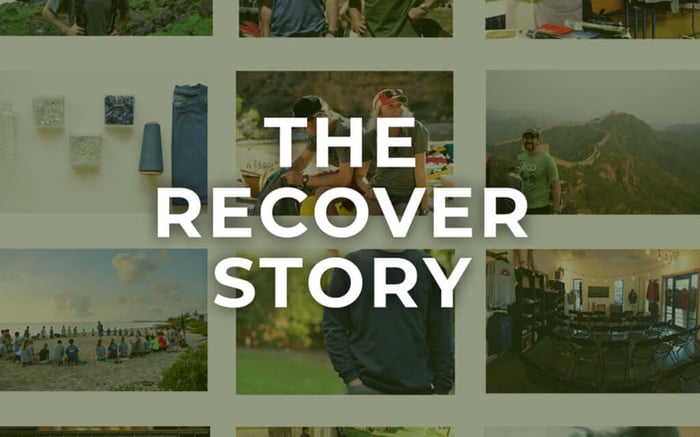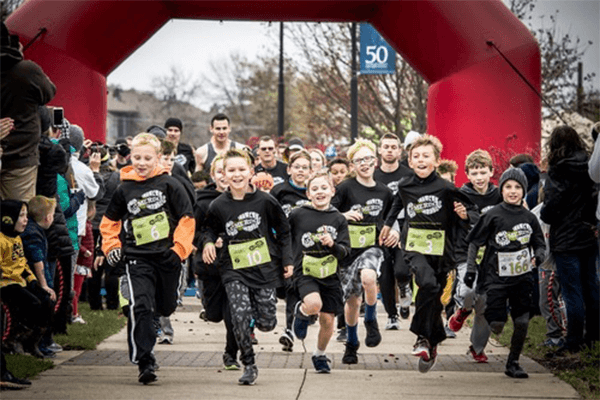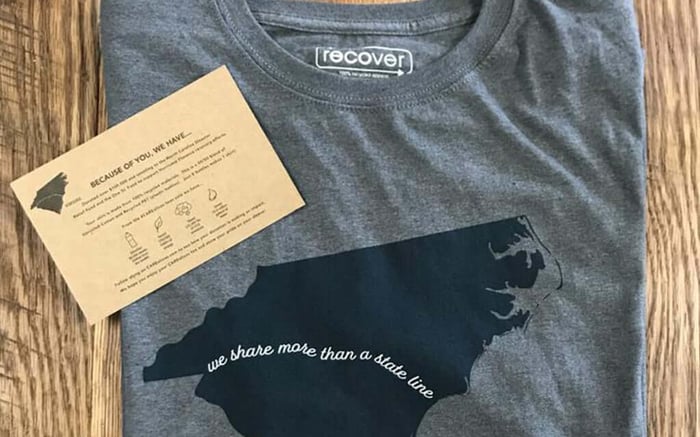
The human body can only survive 3 to 4 days without water. Water makes up at least 60% of our bodies and about 70% of the planet’s surface. Every cell in each of us needs water in order to function, and while water may seem bountiful, less than 0.02% of the total water on earth is the easily-accessible freshwater that humans need to survive. Worldwide, humans depend upon water for sustenance, food production, industry, and enjoyment- but despite this limited resource’s outright necessity, watersheds and waterways everywhere are in constant threat of pollution and contamination. Waterkeepers are nonprofits that protect communities’ rights to clean, drinkable, fishable, swimmable water.
As a 1% For The Planet member, Recover donates a minimum of 1% of our total sales to partner nonprofits. While we give to national nonprofits such as the National Park Foundation and Arbor Day Foundation, we also directly donate to, and volunteer with those making a difference in our own backyard in North Carolina, such as Mountain True and the Watauga, Green, and French Broad Riverkeepers. These organizations sit amongst the many that are working hard to “protect the places we share”, and so we sat down with Mountain True’s Communications Director Karim Olaechea and Watauga Riverkeeper’s High Country Regional Director Andy Hill to learn more about why they do what they do, and to be even more reminded of why we should care.
First of all, what exactly is a “Waterkeeper”?
Andy: A waterkeeper is the primary advocate, watchdog, educator, and spokesman or spokeswoman for a watershed. They are responsible for finding pollution and taking information to local, state and federal governments to hold polluters accountable. Basically, we work to keep watersheds safe and bring contamination issues to government and communities.
Wow- what an enormous job... How do you monitor an entire watershed for contamination?
Andy: We work with a broad base of volunteers and the Volunteer Water Information Network, or VWIN, which is a volunteer-based, surface water monitoring network. Volunteers take monthly water samples and those samples are sent to a certified lab where they are checked for nitrogen, phosphate, and dissolved oxygen. The Watauga Waterkeeper uses these samples to track long term trends over time at 13 sites. We also conduct a weekly test for bacteria.
What are the sources and causes of watershed contamination in North Carolina?
Karim: We’re looking largely at agriculture operations, E. coli, and faulty sewer systems. By doing that weekly water testing, it helps recreators and paddlers on the river to make sure they know the state of the river before going out onto the water. The results from the bacterial testing go to a global monitoring website that anyone and everyone can access called The Swim Guide (there’s also a free Swim Guide smartphone app). It has weekly monitoring results, and makes it easy to find your closest swimming access and the water quality at those locations. We have 14 sites in the high country and in the Green River and French Broad River as well. There are all different waterkeeper alliances, including the Catawba Riverkeeper, working together.
Andy: Also, using the Swim Guide App, anyone can report pollution. That info will go to the closest riverkeeper. For example, a fly fishing guide in the Watauga reported an active sewage leak, and the leak was shut down in a matter of hours.

How does Mountain True play into all of this?
Karim: One thing I’ll say about Mountain True is that we’ve been able to help this region take great strides not just in cleaning the rivers, but also in working as a national land advocacy nonprofit. Mountain True is a merger of 3 other organizations that dated back to the 1980s and now as a unified organization creates a greater regional footprint. Regionwide, we’ve stopped the practice of clearcutting in National Forests in Western NC, helped to pass the Clean Smokestacks Act, and stopped a plan for Duke Energy to cut transmission lines connecting a substation in South Carolina that would have harmed a lot of mountain vistas. Some of the local economies are dependent upon the beauty of that region and the high country. Mountain True was one of the lead advocates at the state level for the Clean Smokestack Act, which drastically reduced acid rain and pollution in many regions and helped these areas to become outdoor meccas. It’s all from active and involved membership.
What’s something that stands out in your work as the Watauga Riverkeeper Andy?
Andy: One of the most significant strides in the Watauga watershed was blocking a plan 3 years ago proposed by the Beach Mountain Community and Ski Resort to draw water out of the Watauga and essentially entirely de-water the river. The project’s proposal was based on projected needs, largely related to the ski resort, but they were wasting 85% of the water they already had, and rather than fixing that, their vision was to take more and drastically change the river system. We organized a grassroots efforts and local citizens voted down the proposal in 2014.

Why did Mountain True and Watauga Riverkeeper partner with Recover?
Andy: Bill and I both used to work at Moondance Adventures, an adventure travel company based out of Asheville that does experiential education adventure service trips around the world, and Bill was the Program Director.
Over the years I got into water quality and began working with Mountain True. When it came to sourcing our merchandise, I knew Recover had a shared passion for sustainability and Mountain True switched to all Recover products. In getting sustainable, eye-catching, high-quality tee products, it allows us to walk the talk from our program values to the products we use and helps spread the word about what we do. There’s been a whole evolution of Recover gear as our programs have grown… anything from the Riverkeeper Beer Series where volunteers clean up trash and then meet up at breweries for a party to the Riverkeeper Float Fest.
Karim: Also, Mountain True is a nonprofit and we have to be considerate of costs. Recover has allowed us to be able to provide shirts, merchandise and products to members that represent and reflect the values of our organization at a price point that works for us. The quality is amazing and people love how they feel and how soft they are. Recover tees have become known among members as really good looking and feeling good as well.
Andy: We also like working with Recover because it’s not only providing a great product, it’s really educating us as well. In turn, we can educate our members and volunteers about eliminating single-use plastic from our lifestyles- it all ties together. Recover also brings out a crew of volunteers to clean-ups, so they’re not only supporting us, they come out in person to help clean up the river, or educate the public … and afterward knock back a couple beers.
What else does Mountain True and Watauga Riverkeeper have going on right now?
Karim: We currently have a partnership in the works with the Green Riverkeeper and American Whitewater on the restoration of hemlock trees in an area that can only be accessed in the steepest section of the Green River Gorge. We partner with hotshot kayakers in an effort called Paddlers For Hemlocks to treat hemlocks down there. It’s super important to the forests and the water quality in the region. We’re starting a crowdfunding initiative in partnership with Recover for that. Recover is such a supportive partner with us, and with that partnership, we’ll have more money from donations going to the hemlock project.
What’s going on with hemlocks? Why is this project needed?
Karim: Hemlock suffers from woolly adelgid blight, an exotic invasive species that’s been killing hemlocks throughout the country. There is a chemical treatment that can be done and is very effective. Paddlers get trained up in the treatment and paddle into inaccessible areas that are so vital to the riparian corridor. These areas sequester water and provide a shade cornerstone of the ecosystem. If you don’t treat these trees, they will be killed.
How can someone become involved in the important work of Mountain True and Watauga Riverkeeper in “protecting the places we share”?
Karim: Go to the Mountaintrue.org Events Calendar, speak to your Regional Director, sign up to volunteer, become a member, donate, there are lots of ways to get involved, and all are valuable. For the Watauga Riverkeeper, you can be in touch with Andy and keep up with info on the website.
Final words?
Andy: We just really enjoy working with Recover. Recover is a really good example of the way businesses in the region do come together as a community with the outdoors, outfitters, community members, and beer to support our rivers and our forests. It’s on the leading edge of that movement, and for us, it’s wonderful to see the values that companies located in Western NC have, and the way they support healthy environments and communities.
